Ocean County homeless 'dehumanized' living among grime, crime and bed bugs in motels
TOMS RIVER — When Jeanne Daidone lost her house in Beachwood last February with nowhere to go after a series of financial setbacks, she turned to the Ocean County Board of Social Services for help.
What she got, she said, was a lecture from a world-weary social worker.
“They said, ‘poor planning’ to me,” Daidone said. “Look, I'm 60 years old. Poor planning? Life can throw you all kinds of curve balls. … The best-laid plans change.”
Daidone found empathy and a place to stay with the local nonprofit charity Just Believe, which operates a “Code Blue” warming shelter in the winter months out of the Riverwood Park Recreation Center in Toms River. But as the center is only permitted to operate when the temperature drops to 35 degrees and below, it was a temporary and rather brief fix.
Eventually, Paul Hulse, Just Believe’s chief executive officer, helped Daidone navigate the bureaucratic labyrinth of the county’s social services agency. In March, she was placed in a local motel, where she found the conditions unsanitary and the room unsafe. The door to her room and a back window are both broken.
“You work hard your whole life and you do the right thing, and you think that if you need something, someone’s gonna be there,” she said. “And it’s not, there's no safety net. Not that anyone owes me a damn.”
With a population of almost 650,000 — larger than the states of Vermont and Wyoming – Ocean County has no full-time homeless shelter or transitional housing for the 114 people on average who are placed in some form of emergency housing here each night. Currently, about 700 people in the county are receiving some type of government assistance to supplement the cost of their housing, according to data from the Board of Social Services.
'I don't feel safe': Ocean County ignored slain homeless woman's pleas; paid estate $1.5M
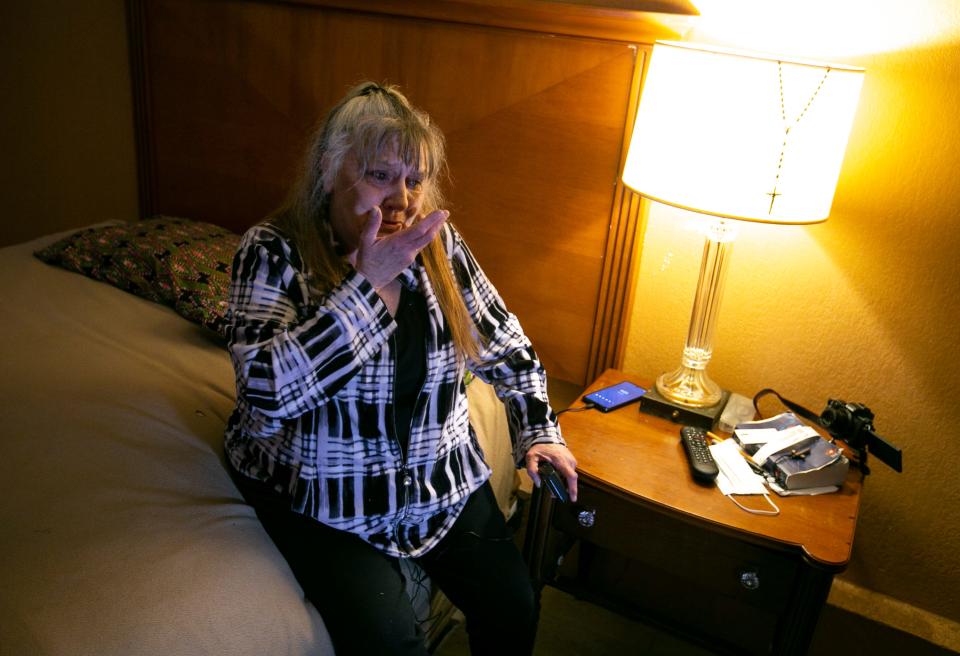
‘Not the Ritz-Carlton’
To house people seeking emergency shelter, the county relies mostly on 10 motels in Toms River and Seaside Heights — with one in Atlantic County — that it contracts with to serve that function. In every case, these motels make most of their money during the summer tourism season but supplement their business all year round by putting the homeless up at the cost to the taxpayer.
“I don’t think any of us would argue that these motels are not — it’s not the Ritz-Carlton,” said Meredith Sheehan, director of the Board of Social Services. “We work with the motels that are willing to work with us. We send out bids.”
Daidone said she doesn’t feel safe at the motel. The door to the room and a back window are broken. Grime is abound. She wraps her hair at night because she said she has seen bugs in the bed. The housekeeping staff told her they have been instructed not to change the sheets for its homeless-designated rooms, she said.
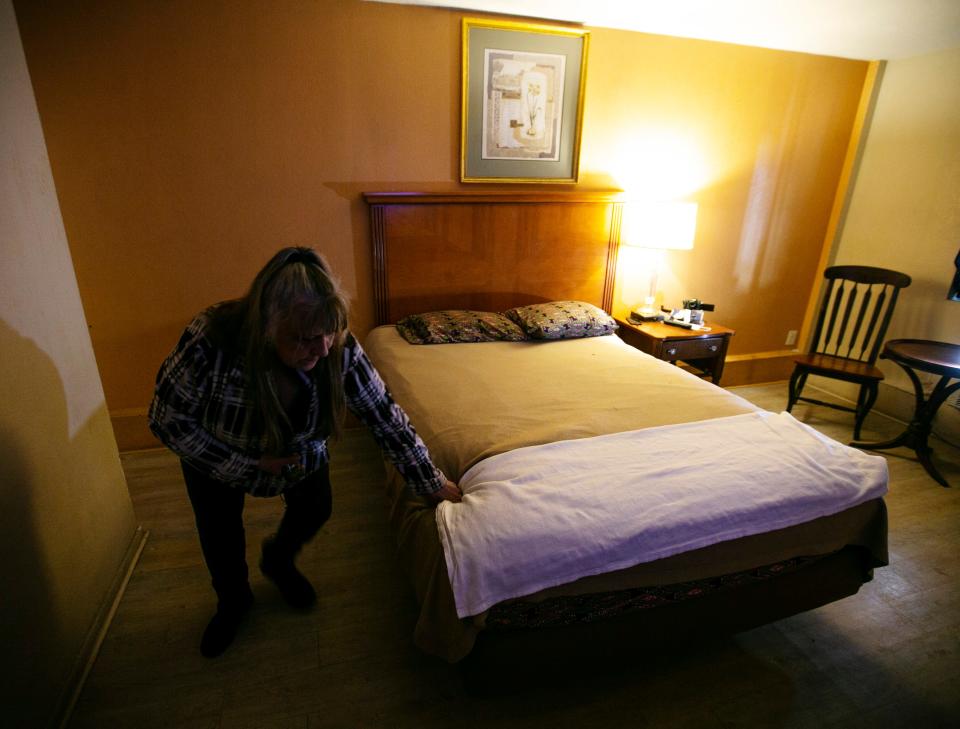
“So, I took them off myself and I tried to wash them in the shower and hang them up,” she said.
Not easy to do when the water in the bathroom has to run for about 20 minutes before it gets hot. Nevertheless, she doesn’t want to seem ungrateful. At least she has a roof over her head. There are many others who are homeless in Ocean County who have long since been abandoned by the system and have moved into the woods, she explained.
The state Department of Community Affairs is responsible for inspecting motels to make certain they are fit for occupancy, Sheehan said.
The county agency also has an employee on staff called a human services specialist who will go out to a motel to address any such complaints when they come to the attention of her staff.
In the case of the motel in which Daidone had been placed, a state inspector had been to the premises twice between February and March, but found no evidence of any of the sanitary and security concerns that Daidone had raised to the Asbury Park Press, Sheehan said.
“They didn’t see those issues,” Sheehan said.
As for the accusation that the motel management was instructing housekeeping staff not to change the sheets on the beds, Sheehan said that would alarming if true.
“Well, if that’s true, we need to know about that,” Sheehan said. “Because that’s unacceptable. Completely unacceptable. It’s not OK to live in conditions where there are bed bugs or broken doors, or things like that. But I assure you, as soon as we’re aware, we investigate those complaints.”
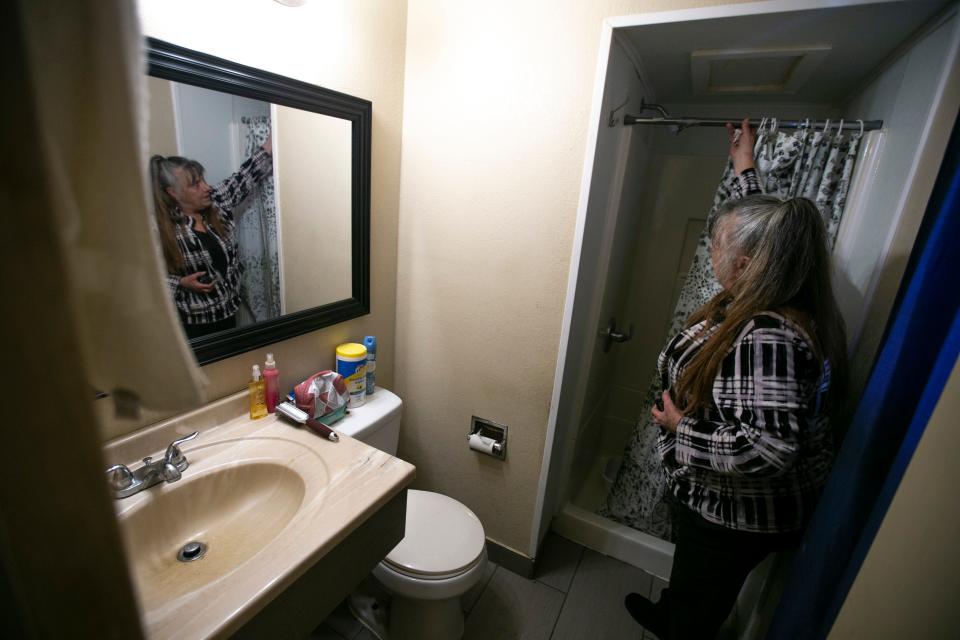
Depression-era bureaucracy
Colleen R. Golin, counsel for the Social Services board, said much of how the board functions today remains based on so-called “poor laws” from the Depression-era 1930s and 1940s.
Of course, the programs administered have evolved.
The county government funds $17 million in local taxpayer money while the state and federal governments contribute the greatest share for a total annual operating budget of $50 million to administer a whole network of more than 50 social services — from New Jersey's Supplemental Nutrition Assistance Program to Temporary Assistance for Needy Families — that most people still refer to as welfare.
In order to be eligible for emergency shelter, a person must already be receiving some form of public assistance, such as supplemental security income, general assistance or the needy family assistance.
“So, if you came in as somebody with no income, we would first help you to apply for (general assistance) or (temporary assistance for needy families), we administer those,” Sheehan said. “Then, if you’re eligible for that, we would then assess whether you’re eligible for emergency assistance.”
The board has a couple of ways of doing that, Sheehan said.
“Everything we do is based on regulation,” she said. “We don’t create the programs. We don’t come up with the policy or the regs. We get that from the state and the feds. So, we have to assess based on a person’s situation if they’re eligible based on the regulation for that program.”
A person who is eligible for emergency assistance might be assessed for substance abuse or mental health issues if there is cause to suspect that such circumstances exist. In that event, there are programs a person may be eligible for based on a referral from a professional.
“If somebody came in and, you know, is acting as if they’re under the influence, well, we wouldn’t maybe look to place them (in a motel) because we want to make sure they’re safe,” Sheehan said.
There are different types of shelters available, whether it’s a residential healthcare facility, an out-of-county shelter, a motel room, or even a treatment center for alcohol or drug addiction.
“We look at the person as a whole, and often we’ll have a social worker also meet with them to make an assessment and help us determine the most appropriate form of housing — if they’re eligible.”
However, Sheehan said the board does not keep statistics breaking down such data.
Moreover, there’s no guarantee that the county will provide emergency shelter to a person who walks in from the street looking for a place to stay for the night, she said.
“It’s not a guarantee,” Sheehan said. “However, we do not let anybody leave our agency without resources or referrals. So, maybe somebody’s not eligible for emergency assistance. We may look to one of our grant programs. We may look at some of the different sheltering options in Ocean County, which we have many: Family Promise, maybe Providence House — (if) it may be a DV (domestic violence) situation; Samaritan House. … Maybe they’re not appropriate for a motel. Maybe they need a higher level of care. Maybe they need to be in a residential healthcare facility, where somebody can oversee their daily needs.”
There are so many people like me' Homeless mom's story highlights growing problem
More: Lunch Break expects to do more for needy with expanded Red Bank headquarters
Finding emergency shelter in Ocean County
The number of motels that submit bids to Social Services has been declining in recent years as property values in Ocean County continue to soar and the kind of mostly seasonal mom-and-pop motels that were once a staple of the Shore are sold off to developers interested in building upscale housing.
“We can only send out bids and the motels that want to work with us are willing to work with us and that number's gotten smaller over time,” Sheehan said.
Ten years ago, 15 of the 26 motels that operated in Seaside Heights in 2013 contracted with the county Board of Social Services and set aside up to 20% of their rooms to shelter the county’s homeless.
Seaside Heights Mayor Anthony Vaz said the county must do more.
“I’ve been an advocate for God knows how many years — 25 years, maybe longer,” Vaz said. "We need a facility in Ocean County, just like you have in Monmouth County, Passaic, Bergen County, a homeless shelter where these people can get the necessary help that they need with doctors’ facilities, transportation.”
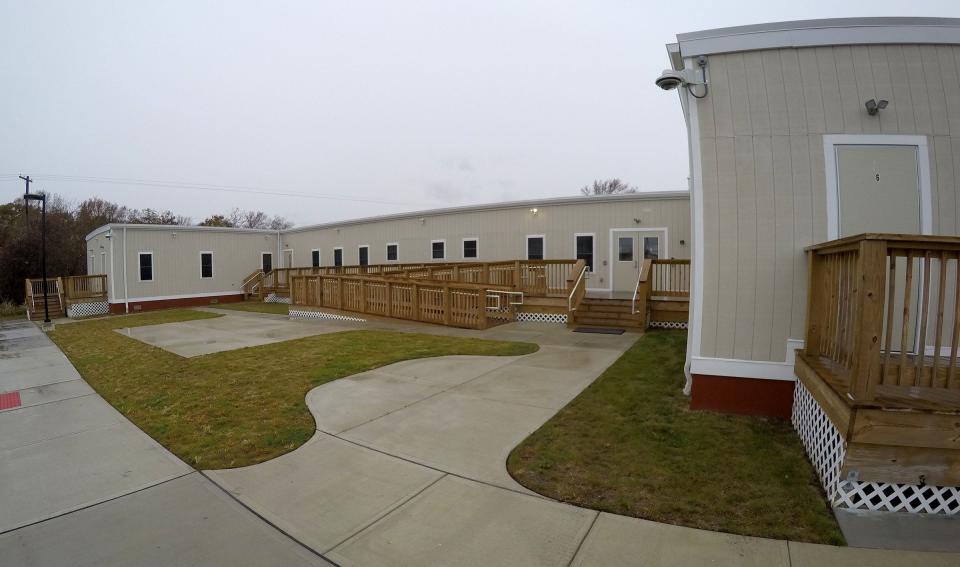
Ocean County Commissioner Gary Quinn does not disagree. He said where the county once had 25 motels to house the homeless, there were 10 today — with one in Egg Harbor Township in Atlantic County.
Going back decades, Ocean County has been criticized as being the only county without some form of government-supported homeless shelter or transitional housing for the homeless. Since Quinn’s election in 2018, he has sought to soften the board’s position on the issue.
“We’ve been battling for the last couple years to try and come up with other alternatives,” Quinn said. “And certainly, transitional housing is something that we’ve all talked about.”
Quinn said the county government has sought a capable and willing partner in a number of non-profit organizations that could establish a transitional housing facility. For example, Monmouth County has partnered with Catholic Charities to shelter homeless families in need, he said.
“It’s not that the county doesn’t want to have a shelter — well, really (a) transitional housing facility — it’s that the county doesn’t want to run it and be operating it,” Quinn said. “Because once you get government involved, the cost skyrockets and it’s just not manageable like it would be with a nonprofit.
“We don’t have, at this point in time, a plan in place where we have a nonprofit willing to step up,” he said. “We’re willing to put up money, we’re willing to do everything we have to do.”
Since the COVID-19 pandemic, the county Board of Commissioners has diverted about $25 million from its share of the Emergency Rental Relief Program — for county households that had a loss of income as a result of the crisis — to beef up its social services’ programs, Quinn said.
“Because COVID created a lot of problems and we have to try and find ways to deal with that,” he said.
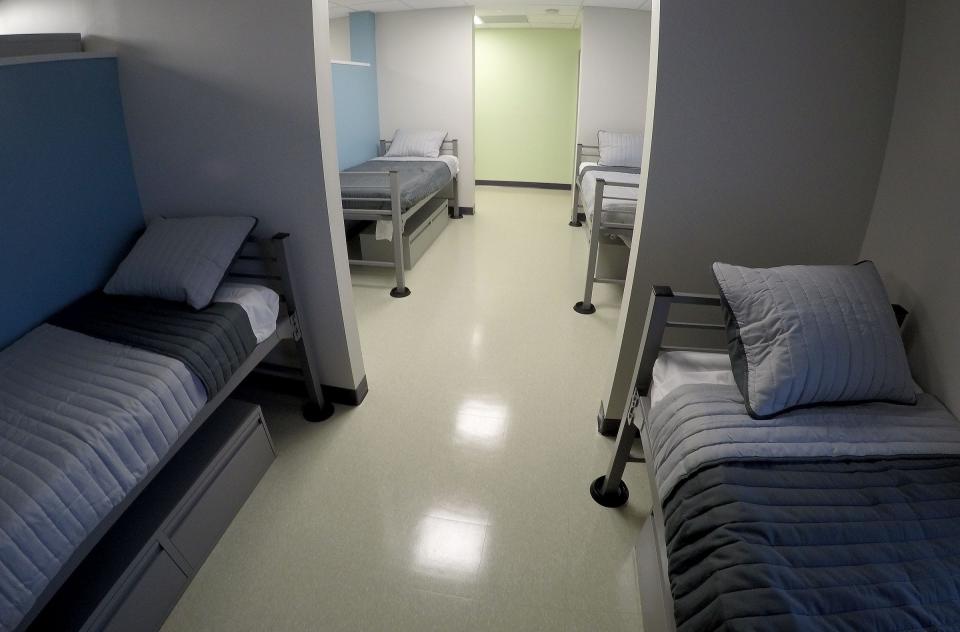
County commissioners: We can do better
Commissioner Barbara Jo Crea said that she is exploring a potential option that was dismissed by a different board more than a decade ago: establishing a homeless trust fund.
Under state law since 2009, counties have the authority to add a surcharge for some paid services provided in the Ocean County Clerk’s Office, for the specific purpose of providing shelter to low-income people in their jurisdictions.
However, successive all-Republican boards in Ocean County in the past have repeatedly dismissed proposals to add the surcharge, interpreting it as a stealthy way of introducing a new tax on the public and they have opposed its implementation on ideological grounds.
Quinn and Crea, who represent the county commissioners on the Social Services board, indicated that a majority of county commissioners are now likely to take a different view.
“I think it's very important,” Crea said. “I think it’s our responsibility to try to help people because they didn’t ask to be put in these situations. We need to help them.”
“We, in the past, we didn’t have the support, you know, but I think in the next month or two you should see that come through,” Quinn said.
“There will be (support),” Crea said.
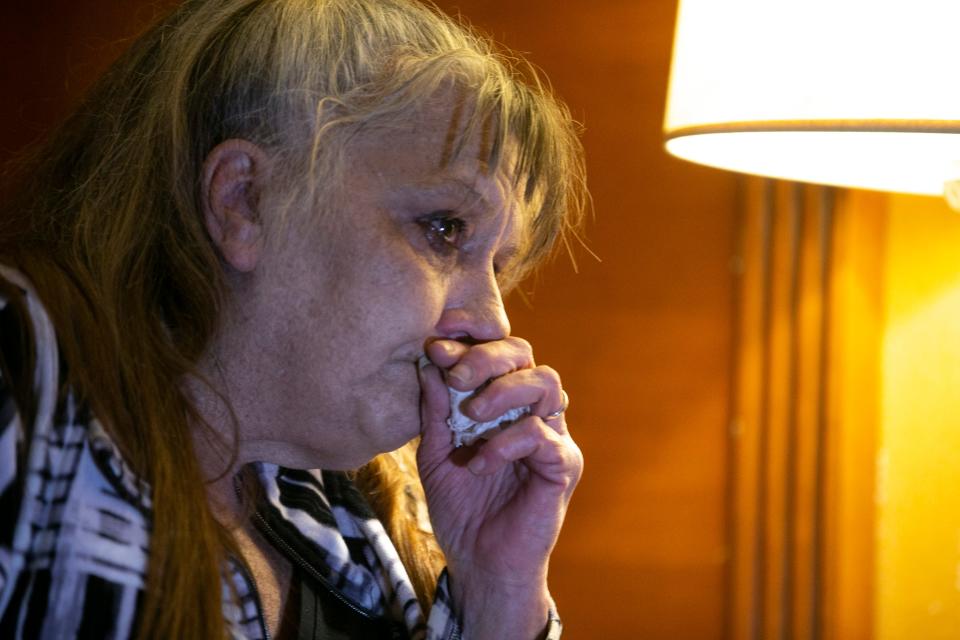
Daidone said she would rather be in a shelter than in a motel room, where there would be a sense of community and services to help her get back on her feet.
“You’re dehumanized,” Daidone said. “You’re not, you’re not like a human anymore. … The only place that did make me feel human again, I told you, was at Just Believe. And that's the truth. Those people are fabulous. And if they could do more, I know they would do it. I know that their hands are tied.”
Hulse said when the warming shelter in Riverwood Park was open this past winter, 26 people per night on average were taking the opportunity to come in from the cold.
During the winter season of 2021-22, the recreation center had provided emergency shelter to 129 guests when conditions permitted it to open on 109 days. This season, the shelter provided the same service to 145 guests even though a milder winter meant that the center was open for 78 days, he said.
There is a growing need, Hulse said.
The organization screens those who wish to come to the shelter at the Toms River bus terminal six miles away, where they’re picked up in vans operated by the organization, he said.
“We have protocols, so you can’t come in like totally intoxicated; wasted and drunk,” Hulse said. “We check bags, so we make sure it’s safe. We ask them to empty their pockets. … We try to keep it as safe as possible.”
Once checked out, a guest is on the honor system — free to come and go, step outside in the middle of the night for a smoke if need be, he explained.
“We always have two facilitators on the floor,” he said. “So, if there’s a problem, they can go right to one of the guys, or myself. And, you know, it’s a good system.”
If someone needs rehab, they work to get that person into such a facility. If they can help get someone situated into permanent housing, they’ll make the effort to see what can be done.
In March, Hulse was working on getting 35 people — including a recent Army veteran — into Section 8 housing. The former soldier had been living in a tent and coming to the warming shelter when conditions enabled Hulse to open.
“I’m fighting with Social Services on his behalf and trying to get his stuff squared away,” Hulse said. “So, we don’t stop working. Even though Code Blue might end, our fight doesn’t end. … We’re still trying to help these guys.”
The government bureaucracy, with its dispassionate rules and regulations, is the most challenging obstacle to getting people the help they need — even for a professional like Hulse who knows his way around the system.
And while Hulse maintains good relations with the county Board of Commissioners, he is frustrated that its members seem perpetually poised to do something to better address the homeless issue in Ocean County, but seem unable to follow through.
“I get so tired of banging on doors that don’t open,” Hulse said. “And that’s what I've seen. So I’m like, OK, there’s got to be somebody out here in the community that wants to do something. I keep hearing some names pop up about how they’ve got money and they want to build the shelter. Call me. Let’s go. I’m ready. Let’s sit down and have a conversation. Let’s put some ink to the pen and let’s get something going. Let’s get serious because we’re ready.”
Asbury Park Press reporter Kathleen Hopkins contributed to this story.
Contact Asbury Park Press reporter Erik Larsen at elarsen@gannettnj.com.
This article originally appeared on Asbury Park Press: Homeless shelters not the 'Ritz-Carlton' in Ocean County

